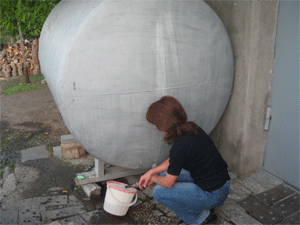 “We are gathering the water in big tanks. After keeping it for a long time it stinks and we drink fetid water.” People suffer without water. Outside the town of Akhaltsikhe, there is a small settlement centered around an old railway luggage station. This tiny hamlet has suffered from a lack of water for the last ten years. The railway luggage station is three kilometers away from Akhaltsikhe and people have been living in the area since 1961. The residents of this area wash their laundry with rainwater.
“We are gathering the water in big tanks. After keeping it for a long time it stinks and we drink fetid water.” People suffer without water. Outside the town of Akhaltsikhe, there is a small settlement centered around an old railway luggage station. This tiny hamlet has suffered from a lack of water for the last ten years. The railway luggage station is three kilometers away from Akhaltsikhe and people have been living in the area since 1961. The residents of this area wash their laundry with rainwater.
When the railway was built in 1944, the water system connected to the luggage station was the responsibility of Georgian Railways. The same water system also supplied the settlement with water. According to local residents, the population has increased over the years and, therefore, Akhaltsikhe’s municipal service should supply them with water. Neither the nearby Tskalkanali water authroity nor Georgian Railway supplies the luggage station settlement with water. This hamlet of 350 peasants has water only once every ten days.
“Can you imagine water only coming once in summer when it’s 40 degree heat? We gather the water in big tanks. After keeping it for a long time it stinks and we drink fetid water,” says a female resident who did not wish to disclose her name.
The residents bring water from a city 3 kilometers away from their settlement.
“We bring the water in cars. Those who don’t have a car pays for or gives fuel to the car owners or brings the water by horse and pays 50 tetri to the horse owner,” says 45 year-old Albert Eghikiani.
Luggage station resident Nazi Gaspariani says that the water situation has “improved” during the last few months and that the population now has water once every four days.
“It would be great if we had water every day, but we don’t, so what should we do?” asks Ararat Gevorqiani.
The rain makes residents of the luggage station neighborhood especially thankful, as the gardens are watered and they can gather water to wash laundry.
The residents of the luggage station colony say that they always pay their electricity taxes, which are used to bring water to them. They pay this money despite not receiving water regularly. According to collector Naira Chlachishvili, only 120 families pay the tax. Part of the community does not receive water because of low pressure in the area and because they do not pay. “The electrical tax of 285 lari is spent monthly,” Chlachishvili says. “Every family has to pay about three lari. Some of them pay 3 lari, some pay 2 lari, some pay 4 lari, it depends how much they have or how they feel.”
The population has entrusted this job to Naira Chlachishvili for the last two months. Chlachishvili says that the water comes only once every four days because a lot of electrical energy is used and the tax is therefore higher and population cannot pay. “If we give water to the luggage station settlement every day, it would cost about thousand lari a month. We won’t be able to raise that kind of money. I must have at least 150 lari for my salary. I bring money to the energy company collected from the population. If there is money left over for me, it is my salary. Sometimes I don’t have any salary.”
According to Chlachishvili, the water system is not registered in the tax code; therefore no one pays taxes on it. “I was told by the Tskalkanali water authority that if we registered with the tax code we would have to pay the tax. They told me to wait for a bit and we would have water by spring. Now I collect the money only to pay for electrical energy,” she says.
According to Guram Sheshaberidze, the director of Akhaltsikhe’s Tskalkanali water authority, administratively, the water system belongs to Georgia Railway and that this is the source of any misunderstanding. “We requested Georgia Railway to transfer the water system to our possession or to maintain it themselves. They place the system’s value at 150 thousand lari, while the whole cost of the Tskalkanali water authority is only 285 thousand lari”.
Shalva Dalalishvili, First Deputy Governor of the municipality, gives us hope that this problem will be solved by next year.
“We are planning to join the luggage station to the main Uravli line of water next year,” Dalalishvili says. “After that the water will go to the population by drift and therefore taxes on it will be less.”
According to Guram Sheshaberidze the line will join to Uravli main line of water passing around the railway water-pumping.
Gulo Kokhodze, Akhaltsikhe



